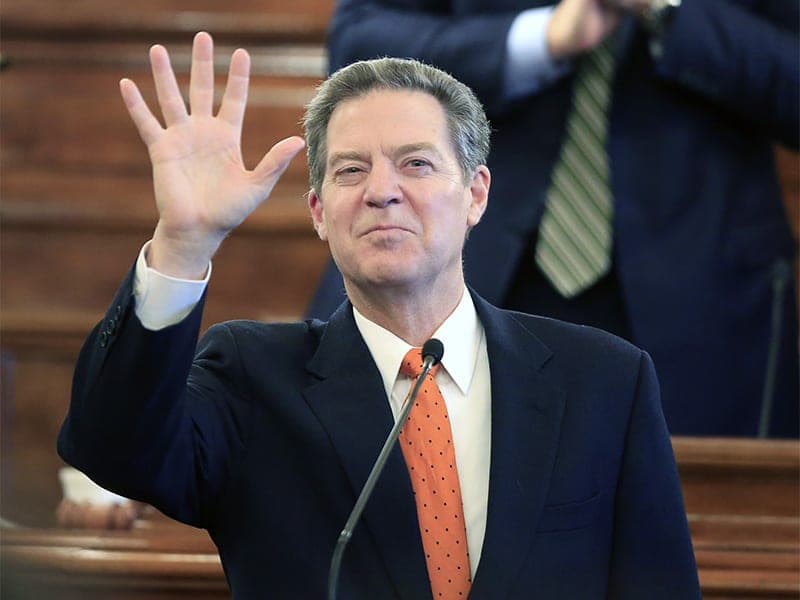WASHINGTON, D.C. — Kansas Gov. Sam Brownback, President Trump’s nominee for international religious freedom ambassador, describes religious freedom as “the choice of what you do with your own soul.”
If confirmed, the 60-year-old, two-term Republican governor, former U.S. senator and one-time presidential candidate would be the first politician confirmed as the ambassador-at-large for international religious freedom. Previous ambassadors were religious or nonprofit leaders, and Brownback would follow a rabbi and a Protestant minister.
“Religious Freedom is the first freedom,” he said in a tweet responding to Trump’s announcement. “I am honored to serve such an important cause.”
Here are five faith facts about this Methodist-turned-Catholic politician:
1. He was a key sponsor of the legislation that created the office he may lead.
As senator, he supported the 1998 International Religious Freedom Act, which also created the ambassadorial post.
During his two terms as governor, “his actions on international religious freedom would be minimal,” said Rabbi David Saperstein, the most recent international religious freedom ambassador. But Brownback’s support of the State Department office while he was senator, and his efforts to end the South Sudan civil war, were noteworthy, Saperstein said.
“Issues of religious freedom were very much at stake in his lead work on the Sudan Peace Act,” he said, adding he thinks Brownback will be “an effective ambassador-at large.”

2. He is a Catholic convert who has attended evangelical churches with his family.
Brownback has been a bit of a Christian church hopper. He grew up a Methodist but converted to Catholicism in 2002. Today he attends Topeka Bible Church, said Teresa Jenkins, a spokeswoman for the nondenominational evangelical church with an average weekly attendance of 1,400.
Sometimes, he rises early for Mass before joining his family at the church, calling the routine, according to author Jeff Sharlet, a “great mixture of the feeding.”
Sharlet’s book,“The Family,” about a secretive Christian group to which Brownback belonged, said the governor was “baptized not in a church but in the ‘Catholic Information Center,’” a Washington chapel run by Opus Dei.
3. He has supported “religious liberty” issues and rallies with conservative Christians.
In 2016, he joined a “Rally for Religious Freedom” alongside Catholic bishops, the lead pastor of Topeka Bible Church and Barronelle Stutzman, a Washington state florist who was sued after she cited her religious beliefs in refusing to create an arrangement for a gay wedding. “I have never seen a bigger rally at this statehouse than this one,” Brownback told the demonstrators, according to a Catholic diocese website. “It is fantastic.”
When then-Texas Gov. Rick Perry, now U.S. energy secretary, invited 49 other governors to attend “The Response: A Call to Prayer for a Nation in Crisis” in Houston in 2011, Brownback was the only other governor who showed up in person. (One other sent a video.)
In 2012, he was criticized by church-state separationists for promoting a ReignDownUSA.com prayer event for which he said, “We’ve been favored like no nation in history and yet too often we’ve forgotten God.”
4. His nomination has been hailed by a range of evangelicals.
The National Association of Evangelicals called Brownback “a strong candidate.” Faith and Freedom Coalition declared “help is on the way” after dozens of reports of Christian persecution abroad “in the last month alone.” Southern Baptist ethicist Russell Moore noted Brownback’s “dealing with AIDS in Africa and advocating on behalf of persecuted religious minorities.” Focus on the Family founder James Dobson called him “a man of deep personal faith.”
5. He signed legislation allowing religious campus groups to restrict membership.
The 2016 bill “allows religious organizations to establish religious belief as qualification for membership,” he said at that time.
The ACLU, reacting to his nomination, said, “In Gov. Brownback’s view, ‘religious freedom’ has meant issuing a license to discriminate against others, especially against LGBT Kansans.”
University of Vermont political science professor Peter Henne said a Brownback appointment could change emphasis on LGBTQ issues abroad: “If there are countries repressing LGBTQ people for reasons they claim are related to religion, we might not push back on that as much as we would otherwise,” he said.












